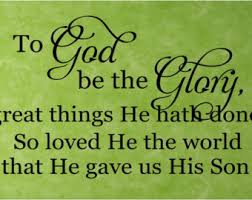
In this post we’re taking a trip across the pond for a hymn that (you may not have known) is entirely American in origin: ‘To God be the glory’, by Fanny J. Crosby, with tune of the same name by William H. Doane.
Fanny J. Crosby (1820-1915) is believed to have had over eight thousand hymn texts published, selling over 100 million copies, enough to make her a household name in the United States at the time of her death. This is even more remarkable when we consider that she became blind shortly after her birth in New York, and remained so for the rest of her life. She took this stoically, claiming that, had she been distracted by the beauty of other things, she would not have had time to do all she did. Crosby began writing poems in support of disability rights for blind people in her twenties, and became a well-known campaigner, addressing both Congress and the Senate (where she was the first woman speaker). She also wrote songs for the popular market, and also patriotic songs for Union cause during the American Civil War (1861-65). A devout Christian, it was inevitable that she would progress to writing hymns, and from 1864 onwards wrote several every week for various publishers. Crosby had many detractors, who criticised her texts for being mawkish and overly sentimental. She was shabbily treated by many publishers who tied her into unfair contracts. Yet her material saw immediate and lasting success, which allowed her to donate large sums to good causes while she remained in comparable poverty. Today her huge contribution to hymnody, if not exactly forgotten, tends to be reduced to the few texts that remain enduringly popular, such as ‘To God be the glory’ and ‘Blessed assurance’.
William Howard Doane (1832-1915) was Fanny Crosby’s principal musical collaborator. He was not a professional musician, but a Connecticut industrialist who sold woodworking machines. It so happened that he had a talent (which he called his ‘avocation’) for composing memorable tunes with strong, gospel-style harmonies. For a long time he resisted writing hymn-tunes, hoping that he would make his name as a highbrow classical composer. But in 1862 he suffered a serious heart attack on a train, and once recovered, dedicated his efforts to devotional music. He met Fanny Crosby in 1867, and began a working relationship that would lead to the composition of around fifteen hundred hymns. Doane would usually write the tune first, and then supply it to Crosby to fill in the lyrics. TO GOD BE THE GLORY was written around 1872 and published three years later, to fleeting success in the United States, but – interestingly – more lasting acclaim in England, where it endured for many years. It was heard by the American evangelist Billy Graham, on tour in the UK in the 1950s, who reintroduced the hymn to its country of origin. It enjoys renewed popularity on both sides of the Atlantic to this day.
A rousing version from the Royal Albert Hall:
https://www.youtube.com/watch?v=-15v9iworAU
Rob Charles takes us through the stops at All Saints, Oystermouth:
https://www.youtube.com/watch?v=YLtLyI-uMY0
Samuel Metzger’s energetic arrangement from Coral Ridge Presbyterian Church:
https://www.youtube.com/watch?v=EBqcIymsE_I
As ever, this post’s descant it’s free to download and use, so please do so, and let us know how you get on. And we’d be delighted to receive any audio or video of your attempts.
‘To God be the glory’ is a perennial that suits more or less any time of year. But you may wish to revisit it for Christ the King on 22nd November, along with some of these:
- Alleluia, sing to Jesus (William Chatterton Dix)
- All hail the power of Jesus’ name (Edward Perronet)
- Crown him with many crowns (Matthew Bridges / Godfrey Thring)
- Jesus shall reign where’er the sun (Isaac Watts)
- O for a thousand tongues to sing (Charles Wesley)
- O worship the king (Robert Grant, after William Kethe)
- Praise my soul the king of heaven (Henry Lyte)
- The king of love my shepherd is (Henry Baker)

